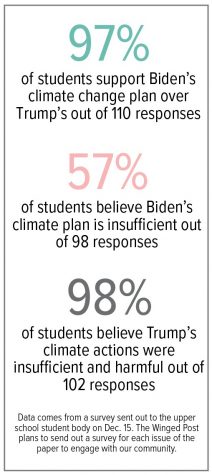Global Reset: Biden pledges a progressive climate change plan
President-elect Joe Biden has pledged to adopt a progressive stance on climate change and to reverse President Donald Trump’s actions. The Biden Administration has also expressed a concern for environmental justice, or the disproportionate harm of pollution on people of color and low-income communities.
January 19, 2021
President-elect Joe Biden has pledged to adopt a progressive stance on climate change and to reverse President Donald Trump’s actions. Biden’s main plan, driven by a desire to see a clean energy revolution and to bring environmental justice, focuses on reviving programs targeted by Trump and developing sustainable energy sources.
“The Trump administration rolled back a lot of the environmental regulations—over 100—and it was disheartening for me and for a lot of people in our youth in our generation because it affects our future,” Natasha Yen (12), the co-president of Green Team, said. “I think this election was such a big turning point in the direction in which the American people wanted to take our future, and I think the environment was a huge factor in it.”
Throughout his presidency, Trump established policies that erased or loosened nearly one hundred rules and regulations on pollution in air, water, and atmosphere, with 72 completed and 27 in progress. He dismissed several United States Environmental Protection Agency (EPA) panels and cut the National Aeronautics and Space Administration (NASA) Climate Monitoring Program.
Not only did his administration roll back on these policies, but they also promoted fossil fuel and coal use and proposed to subsidize carbon emissions. Most substantially, in 2017, Trump withdrew the United States from the 2015 Paris Agreement, an international agreement which aims to mitigate climate change.
“Paris was in some ways a breakthrough because countries agreed to a different framework: they agreed to say ‘let’s individually as countries set targets and limits and timelines that we think we can achieve and we will pledge those reductions,’ and everyone will do what they think they can do,” Professor Matt Steuerwalt, an associate professor at the University of Washington said. “Having that international treaty govern everybody’s actions is really a way for nations to hold each other accountable.”
According to the Biden For President campaign, Biden’s plan for a clean energy revolution includes a pledge to get the United States to net-zero emissions and 100% clean energy economy by 2050, along with increases in carbon tariffs and a passing of federal carbon pricing legislation, where individuals would pay for their own carbon pollution, by 2025. Recognizing that transportation is a large contributor to climate change, he promises to lock in enforceable commitments that will reduce emissions in global shipping and aviation. Furthermore, his administration pledges to end subsidies to fossil fuel companies and wants to rejoin the 2015 Paris Agreement.
“I’m really hopeful with Biden because he said that climate change was actually his third priority to focus on during his presidency and he’s already drafted a plan to work on a more sustainable living for everyone,” said Ada Praun-Petrovic (10), co-founder of the nonprofit organization focused on climate change activism.
The Biden Administration has also expressed a concern for environmental justice, or the disproportionate harm of pollution on people of color and low-income communities. They plan to advance the White House Environmental Justice Advisory Council and White House Environmental Justice Interagency Council, which are federal environmental justice groups, and to initiate an Environmental and Climate Justice Division within the U.S. Department of Justice.
Although Biden’s plan pushes our country in the right direction, there is still more that he could do. His ambitious new regulations would come with challenges, including being able to provide jobs for those previously in the coal mining and fossil fuel industry. So even with his promise to bring a clean energy revolution, he has been reluctant to outright ban fossil fuel use.
“Frankly, the plan itself is alright. It could definitely be a lot better. I personally think he’s focusing on the wrong areas, and I also understand why. Because as a politician who’s not as rich as Trump, Biden is being funded by a lot of private corporations, and it is directly against the interests of these corporations to have laws passed that will inhibit their production capacity,” said Ada. “I think that’s also part of the reason why Biden has publicly stated that he refuses to ban fracking.”
With more progressive actions from the Biden administration, hopefully, the dangerous effects of climate change can be delayed or diminished.
“Even with our new president who obviously believes in science, we still need to push forward a strong agenda in addressing climate change and other environmental issues,” Natasha said. “It doesn’t stop with just an election.”


















![“[Building nerf blasters] became this outlet of creativity for me that hasn't been matched by anything else. The process [of] making a build complete to your desire is such a painstakingly difficult process, but I've had to learn from [the skills needed from] soldering to proper painting. There's so many different options for everything, if you think about it, it exists. The best part is [that] if it doesn't exist, you can build it yourself," Ishaan Parate said.](https://harkeraquila.com/wp-content/uploads/2022/08/DSC_8149-900x604.jpg)




![“When I came into high school, I was ready to be a follower. But DECA was a game changer for me. It helped me overcome my fear of public speaking, and it's played such a major role in who I've become today. To be able to successfully lead a chapter of 150 students, an officer team and be one of the upperclassmen I once really admired is something I'm [really] proud of,” Anvitha Tummala ('21) said.](https://harkeraquila.com/wp-content/uploads/2021/07/Screen-Shot-2021-07-25-at-9.50.05-AM-900x594.png)







![“I think getting up in the morning and having a sense of purpose [is exciting]. I think without a certain amount of drive, life is kind of obsolete and mundane, and I think having that every single day is what makes each day unique and kind of makes life exciting,” Neymika Jain (12) said.](https://harkeraquila.com/wp-content/uploads/2017/06/Screen-Shot-2017-06-03-at-4.54.16-PM.png)








![“My slogan is ‘slow feet, don’t eat, and I’m hungry.’ You need to run fast to get where you are–you aren't going to get those championships if you aren't fast,” Angel Cervantes (12) said. “I want to do well in school on my tests and in track and win championships for my team. I live by that, [and] I can do that anywhere: in the classroom or on the field.”](https://harkeraquila.com/wp-content/uploads/2018/06/DSC5146-900x601.jpg)
![“[Volleyball has] taught me how to fall correctly, and another thing it taught is that you don’t have to be the best at something to be good at it. If you just hit the ball in a smart way, then it still scores points and you’re good at it. You could be a background player and still make a much bigger impact on the team than you would think,” Anya Gert (’20) said.](https://harkeraquila.com/wp-content/uploads/2020/06/AnnaGert_JinTuan_HoHPhotoEdited-600x900.jpeg)

![“I'm not nearly there yet, but [my confidence has] definitely been getting better since I was pretty shy and timid coming into Harker my freshman year. I know that there's a lot of people that are really confident in what they do, and I really admire them. Everyone's so driven and that has really pushed me to kind of try to find my own place in high school and be more confident,” Alyssa Huang (’20) said.](https://harkeraquila.com/wp-content/uploads/2020/06/AlyssaHuang_EmilyChen_HoHPhoto-900x749.jpeg)














